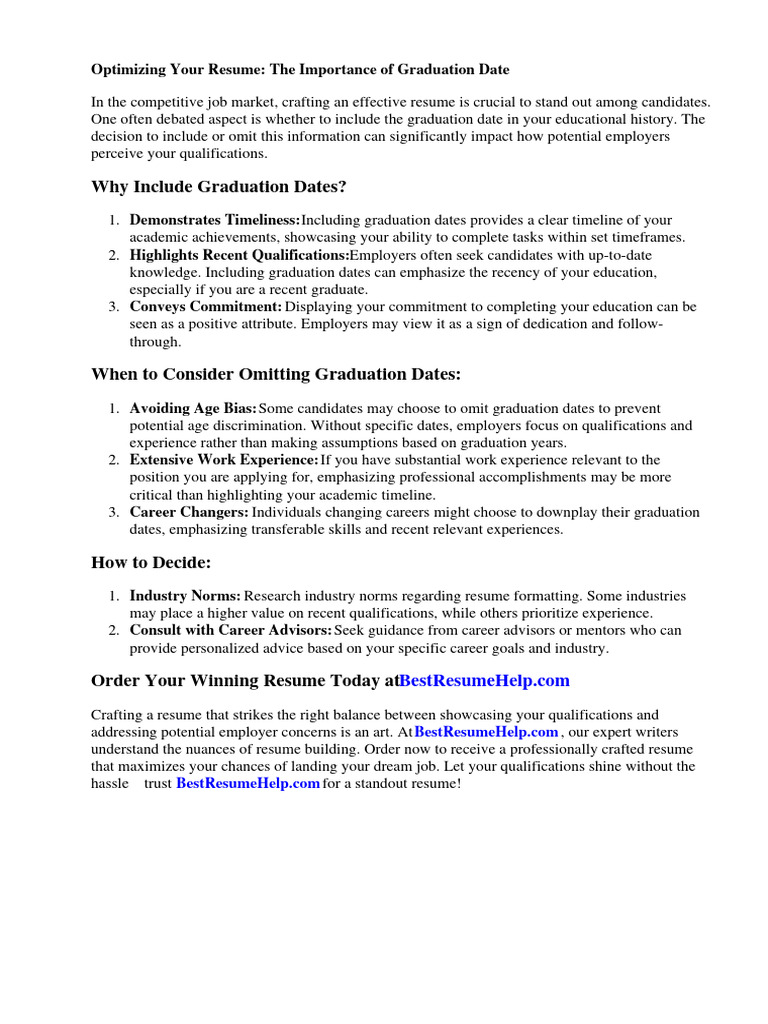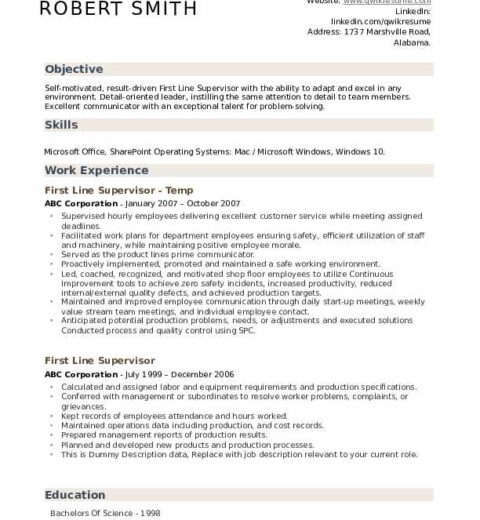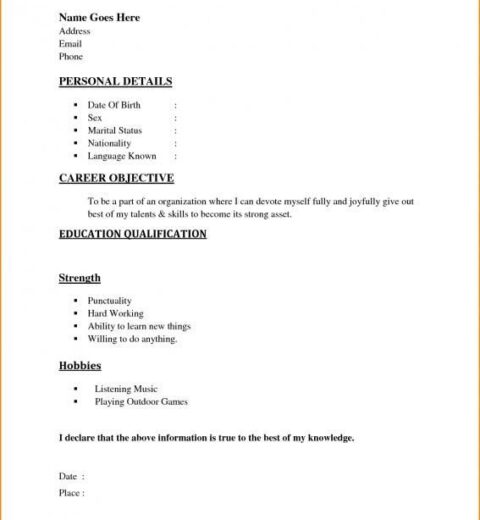In the contemporary landscape of job applications, the resume serves as a critical artefact—an extension of one’s professional persona. Among the myriad of components that contribute to a polished resume, the graduation date is a seemingly innocuous detail, yet it carries significant weight. Properly articulating the year of graduation can lend clarity to your educational timeline while effectively positioning you in the minds of potential employers.
Firstly, it’s imperative to contextualize the necessity of including your graduation date. It serves as a definitive marker, denoting not only your academic credentials but also your relative recency in the educational sphere. Employers frequently sift through countless resumes, often employing a chronological lens to discern candidates whose qualifications align with the exigencies of the role. Herein lies the pivotal question: How should one navigate the inclusion of this detail in a manner that preserves professionalism while amplifying appeal?
One of the cardinal rules of resume writing is consistency. When presenting your graduation date, ensure it aligns with the formatting and style of your overall document. This will instill a sense of cohesion and make your resume visually engaging to the reader. Typically, the graduation date is situated within the education section, immediately following the institution’s name and degree received. For example:
University of Sample, Bachelor of Arts in English, May 2023Here, the month and year format is employed, which tends to be favored in most professional contexts. However, the decision to include the month can be subjective; occasionally, simply listing the year suffices, particularly if you are several years out from graduation. This adjustment not only streamlines the information but also sidesteps any awkward conversations that might arise regarding gaps in experience.
Furthermore, it’s essential to consider the implications of your graduation date relative to your career stage. Recent graduates may wish to accentuate their newness to the job market, showcasing enthusiasm and current knowledge applicable to the role. Conversely, those who have been in the workforce longer may elect to omit graduation details altogether, diverting focus toward work experience that highlights their evolution in the industry. This strategic pivot may obfuscate any potential bias against age or perceived obsolescence in certain fields.
Yet, merely presenting the graduation year is not sufficient; one must also consider the broader narrative crafted through the resume. Educational experiences, honors, and involvement in extracurricular activities should accompany the graduation date. For instance, listing distinctions such as honors or relevant projects can bolster your narrative and demonstrate how your academic achievements translate into real-world capabilities:
University of Sample, Bachelor of Arts in English, May 2023
- Graduated Cum Laude
- Editor of the University Literary Magazine
- Completed a focused thesis on Modern PoetrySuch details enrich the resume, compelling employers not only to note the date but also to contextualize it within your overall trajectory. Engaging an employer’s curiosity by offering a glimpse into your academic journey—combined with tangible outcomes—can engender greater interest in your candidacy.
Moreover, for professionals pivoting to new careers or industries, a thoughtful adjustment of how graduation details are presented can make a significant difference. Instead of fixating solely on the graduation date, one might opt to stress continuing education or relevant additional certifications. This tactic can illuminate your adaptability and lifelong learning attitude without fixating on a past timeline that may no longer align with your target job industry.
Of note, this perspective shift can yield dividends. When speaking to relevant certifications or courses undertaken post-graduation, you exhibit not only your academic foundation but also an eagerness to stay pertinent in an evolving job market. For instance:
Continuing Education:
- Digital Marketing Certification, Completed August 2023
- Project Management Professional (PMP), In ProgressThis approach elucidates a proactive attitude—the choice to remain engaged and informed within your field. Such signatures of diligence can resonate profoundly with hiring managers, who often privilege candidates demonstrating initiative.
As one might expect, becoming adept at seamlessly integrating the graduation date into your resume also necessitates an understanding of its potential disadvantages. For those who graduated many years ago, listing a date might inadvertently signal obsolescence, especially in rapidly evolving fields like technology. In such cases, it might be prudent to forgo the graduation date altogether, allowing your extensive experience and skill set to take center stage without the spectre of age bias affecting visibility.
Additionally, for candidates who did not graduate, exploring alternative paths—such as relevant experience, training, or certifications—offers a means to communicate competency without diminishing credibility. By centering the information on practical skills rather than academic history, you pivot the narrative toward merit-based qualifications.
Finally, ensuring that the graduation date is updated and accurate cannot be overstated. Outdated or inaccurate information serves only to erode trust and may lead to disqualification from potential opportunities, as discrepancies can raise red flags in the eyes of potential employers. Maintaining an up-to-date resume is an ongoing responsibility that reflects your commitment to professionalism.
In conclusion, the method of integrating your graduation date into your resume warrants thoughtful consideration. By contemplating your audience, maintaining consistency in formatting, enriching your educational narrative, and balancing presentation with strategic foresight, you can transform this ostensibly mundane detail into a powerful asset that strengthens your overall profile. The graduation date, when handled adeptly, becomes less a simple marker of time and more a doorway into your professional identity.




